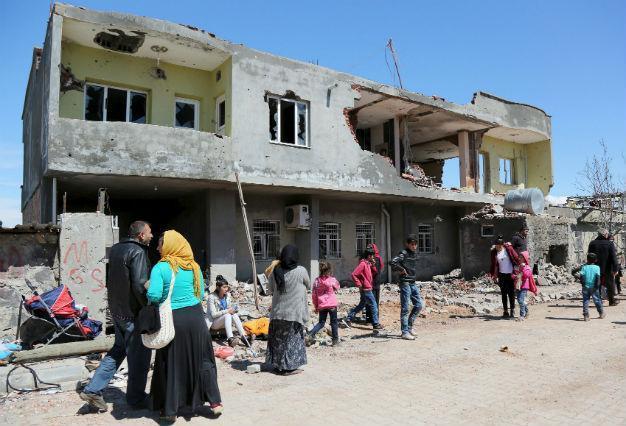Thousands return to ruined İdil after 43-day curfew
ŞIRNAK/DİYARBAKIR

REUTERS photo
Residents of the southeastern district of İdil who were forced to flee their homes during a 43-day curfew imposed to conduct operations against the outlawed Kurdistan Workers’ Party (PKK), have started returning to their homes as security forces eased safety measures and allowed entries to the district.
The curfew, which went into effect on Feb. 16, was partially lifted as of 4:30 a.m. on March 31, paving the way for the return of thousands of İdil residents. The curfew will however continue to remain in effect between 9:30 p.m. and 4:30 a.m. daily, while houses will not be provided with water due to damages to the district’s water supply network during anti-terror operations.
The arrival of locals from early March 31 created long lines along İdil’s entrance, where security authorities admitted citizens following identity and body checks.
Hundreds of houses and offices in the district’s Turgut Özal and Yeni neighborhoods were severely damaged while offices lined up along Alanya and Adile Naşit streets were completely burned down, according to initial reports from the town.
İdil’s municipal building was also found in ruins, in addition to the district office of the Peoples’ Democratic Party (HDP), while reports suggested electricity was currently unavailable across the district.
The lifting of the curfew was announced by Ali İhsan Su, the governor of the southeastern province of Şırnak, with a statement at İdil’s district governor’s office, whereby he thanked the residents of İdil for their support and provided details of the operation’s outcome.
“208 barricades, 72 ditches and 462 improvised explosive devices were disposed of as part of this operation,” Su told reporters, adding that a high number of Kalashnikovs, pump-rifles, grenades and organizational documents had been seized and many PKK militants had been killed.
“I extend my gratitude to our valuable citizens who displayed outstanding patience, understanding and support to our security forces through this period,” Su added.
The governor also explained the measures which will be taken to compensate the losses of İdil’s residents who suffered from the consequences of the operations, suggesting all persons in need will be rehabilitated socially and economically. A damage assessment process will also soon begin, Su vowed, asking all residents to cooperate with state authorities.
Meanwhile, a controversial effort to reconstruct damaged buildings and demolish unlicensed constructions was launched in the Sur district of the southeastern province of Diyarbakır, where the ministers of environment, culture and development paid a visit March 31.
Development Minister Cevdet Yılmaz, Environment and Urban Planning Minister Fatma Güldemet Sarı and Culture and Tourism Minister Mahir Ünal held a joint press meeting in the conference room of Diyarbakır’s governor’s office and announced that an urban renewal project was set to begin in the region.
Sarı said the plan was merely a continuation of a 2012 project by the Diyarbakır municipality, which stalled after the city’s mayor changed. Sarı also denied allegations that Sur would be used to gain unearned income via construction projects.
“Rumors about TOKİ’s [Housing Development Administration of Turkey] construction of high-rise buildings in Sur, about gaining unearned income or gentrification are absolutely worthless and incorrect,” Sarı said, explaining residents will be allowed to make a choice about where to own property.
The plan, however, was met with criticism from some 310 civil society organizations in Diyarbakır on March 30, as the groups’ representatives pledged to pursue legal means to fight the “expropriation” plan.
Similarly, main opposition Republican People’s Party’s (CHP) Istanbul deputy Sezgin Tanrıkulu held a press conference at the Turkish parliament building March 31, defining the progression of the plan, whereby the government allegedly would seize first and justify later, as “unlawful.”
